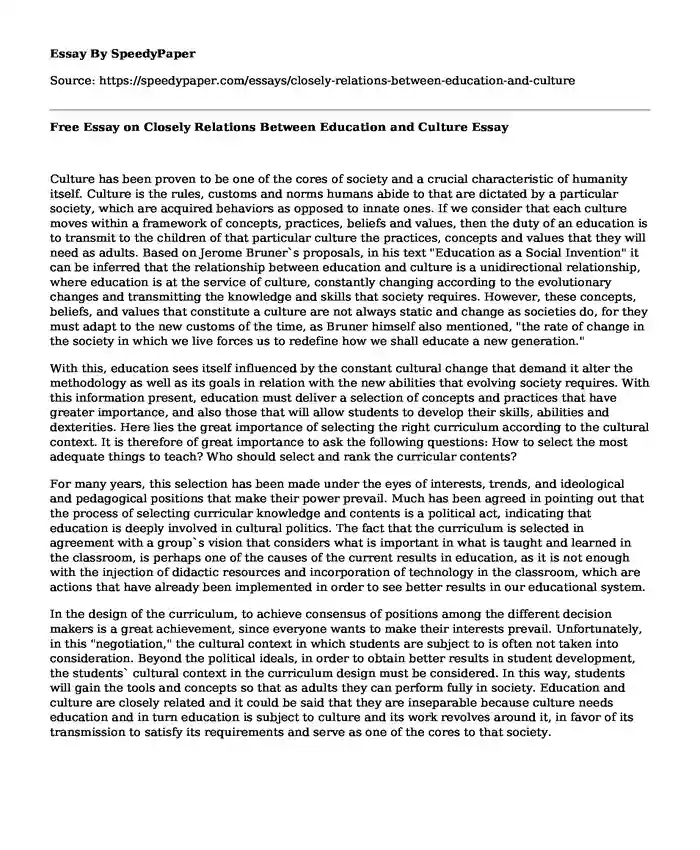Culture has been proven to be one of the cores of society and a crucial characteristic of humanity itself. Culture is the rules, customs and norms humans abide to that are dictated by a particular society, which are acquired behaviors as opposed to innate ones. If we consider that each culture moves within a framework of concepts, practices, beliefs and values, then the duty of an education is to transmit to the children of that particular culture the practices, concepts and values that they will need as adults. Based on Jerome Bruner`s proposals, in his text "Education as a Social Invention" it can be inferred that the relationship between education and culture is a unidirectional relationship, where education is at the service of culture, constantly changing according to the evolutionary changes and transmitting the knowledge and skills that society requires. However, these concepts, beliefs, and values that constitute a culture are not always static and change as societies do, for they must adapt to the new customs of the time, as Bruner himself also mentioned, "the rate of change in the society in which we live forces us to redefine how we shall educate a new generation."
With this, education sees itself influenced by the constant cultural change that demand it alter the methodology as well as its goals in relation with the new abilities that evolving society requires. With this information present, education must deliver a selection of concepts and practices that have greater importance, and also those that will allow students to develop their skills, abilities and dexterities. Here lies the great importance of selecting the right curriculum according to the cultural context. It is therefore of great importance to ask the following questions: How to select the most adequate things to teach? Who should select and rank the curricular contents?
For many years, this selection has been made under the eyes of interests, trends, and ideological and pedagogical positions that make their power prevail. Much has been agreed in pointing out that the process of selecting curricular knowledge and contents is a political act, indicating that education is deeply involved in cultural politics. The fact that the curriculum is selected in agreement with a group`s vision that considers what is important in what is taught and learned in the classroom, is perhaps one of the causes of the current results in education, as it is not enough with the injection of didactic resources and incorporation of technology in the classroom, which are actions that have already been implemented in order to see better results in our educational system.
In the design of the curriculum, to achieve consensus of positions among the different decision makers is a great achievement, since everyone wants to make their interests prevail. Unfortunately, in this "negotiation," the cultural context in which students are subject to is often not taken into consideration. Beyond the political ideals, in order to obtain better results in student development, the students` cultural context in the curriculum design must be considered. In this way, students will gain the tools and concepts so that as adults they can perform fully in society. Education and culture are closely related and it could be said that they are inseparable because culture needs education and in turn education is subject to culture and its work revolves around it, in favor of its transmission to satisfy its requirements and serve as one of the cores to that society.
Cite this page
Free Essay on Closely Relations Between Education and Culture. (2017, Jul 11). Retrieved from https://speedypaper.net/essays/closely-relations-between-education-and-culture
Request Removal
If you are the original author of this essay and no longer wish to have it published on the SpeedyPaper website, please click below to request its removal:
- Department Chair Action Plan - Free Essay in Education Management
- Essay Example on the Role of the Federal Reserve
- Free Essay Example on Religious Beliefs
- The Struggle for Homeostasis, Literary Essay Example
- Essay Example on Why Death Penalty Is Not Appropriate
- Essay Sample on Life-Changing Moment
- Paper Example. Online Learning is Less Satisfactory than Face-To-Face
Popular categories





